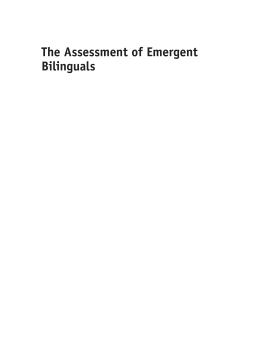
Additional Information
Book Details
Abstract
This textbook is a comprehensive introduction to the assessment of students in K-12 schools who use two or more languages in their daily life: English Language Learners (ELLs), or Emergent Bilinguals. The book includes a thorough examination of the policy, history and assessment/measurement issues that educators should understand in order to best advocate for their students. The author presents a decision-making framework called PUMI (Purpose, Use, Method, Instrument) that practitioners can use to better inform assessment decisions for bilingual children. The book will be an invaluable resource in teacher preparation programs, but will also help policy-makers and educators make better decisions to support their students.
Mahoney presents an expert and practical guide to key issues in the assessment of bilingual children, guiding teachers and administrators to make informed decisions about children’s language development and academic growth in school settings. The book makes complex issues easily understood, and illustrates the appropriate use of tests with informative examples of good and bad assessment practices.
Testing is taking over. With a focus on emergent bilinguals, Mahoney reminds us that assessment cannot and should not be the same for all learners. This book should be read cover to cover by anyone who works with bilingual students or who makes policies that impact their futures.
Kate Mahoney is Associate Professor in TESOL at the State University of New York at Fredonia, USA. She has taught bilingual learners in the US and Belize. Her research has focused on the assessment of Emergent Bilinguals. The PUMI framework she presents in this book is beginning to be adopted and studied in courses across the US.
Table of Contents
| Section Title | Page | Action | Price |
|---|---|---|---|
| Contents | v | ||
| Acknowledgments | vii | ||
| Introduction | 1 | ||
| 1 A Decision-Making Process Called PUMI | 5 | ||
| 2 History: How Did We Get Here? | 20 | ||
| 3 Validity | 40 | ||
| 4 Methods | 56 | ||
| 5 Content and Language | 80 | ||
| 6 Psychometrics | 106 | ||
| 7 Accommodations | 119 | ||
| 8 Special Education | 137 | ||
| 9 Accountability | 159 | ||
| Advice for Instructors on Chapter Activities | 173 | ||
| Glossary | 189 | ||
| Index | 197 |
